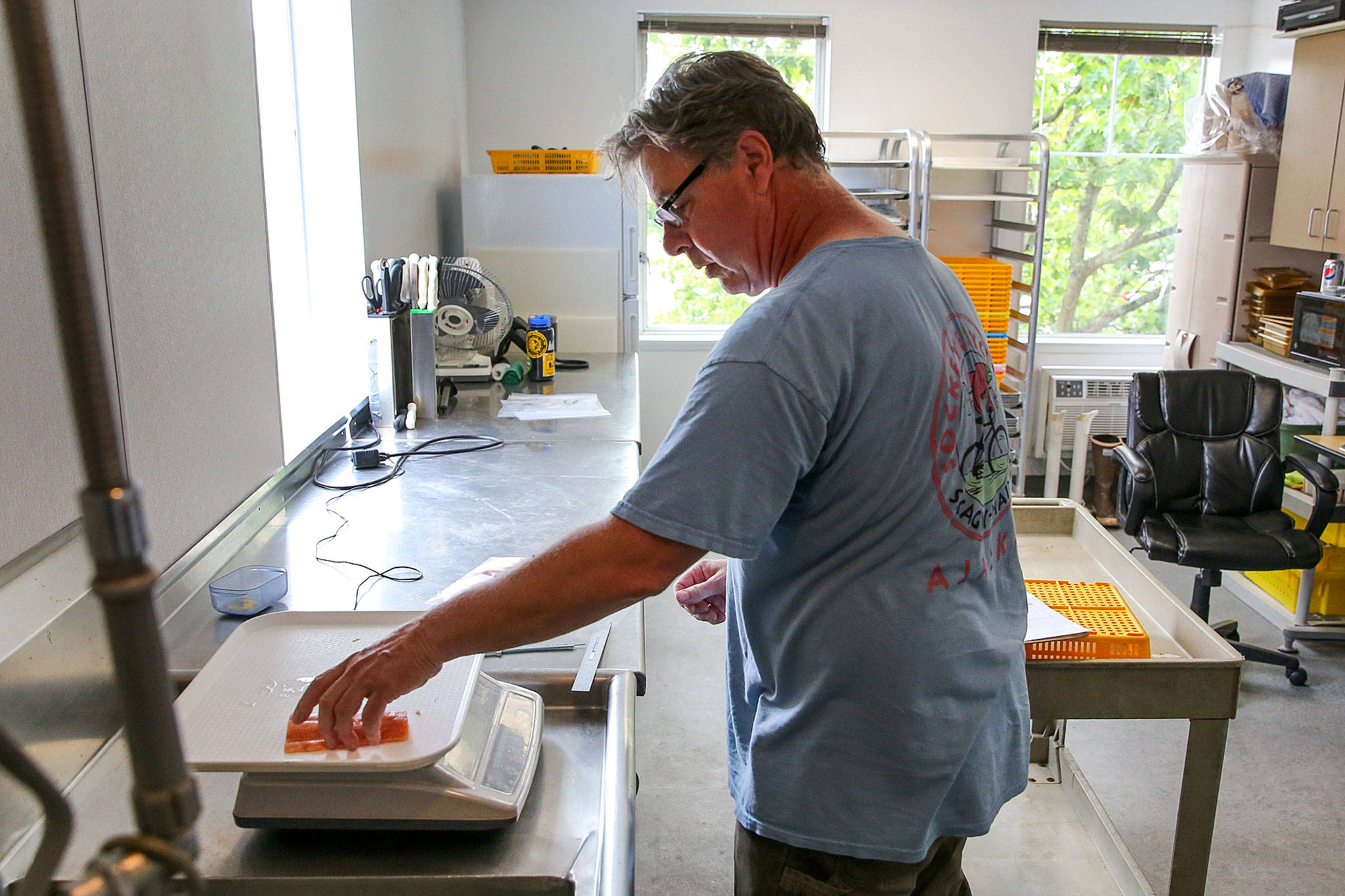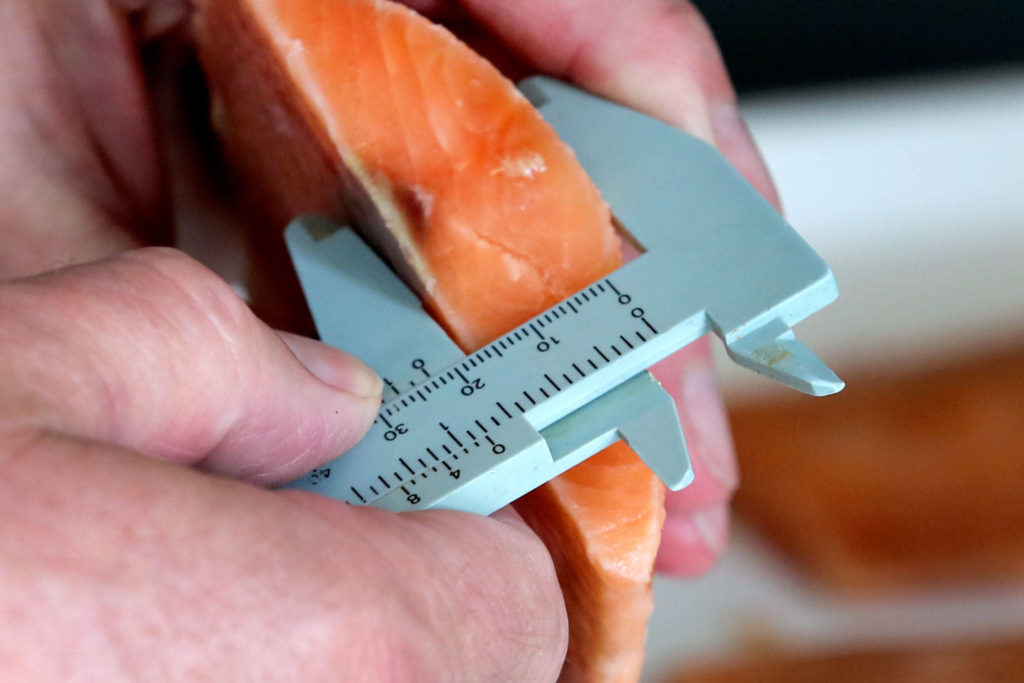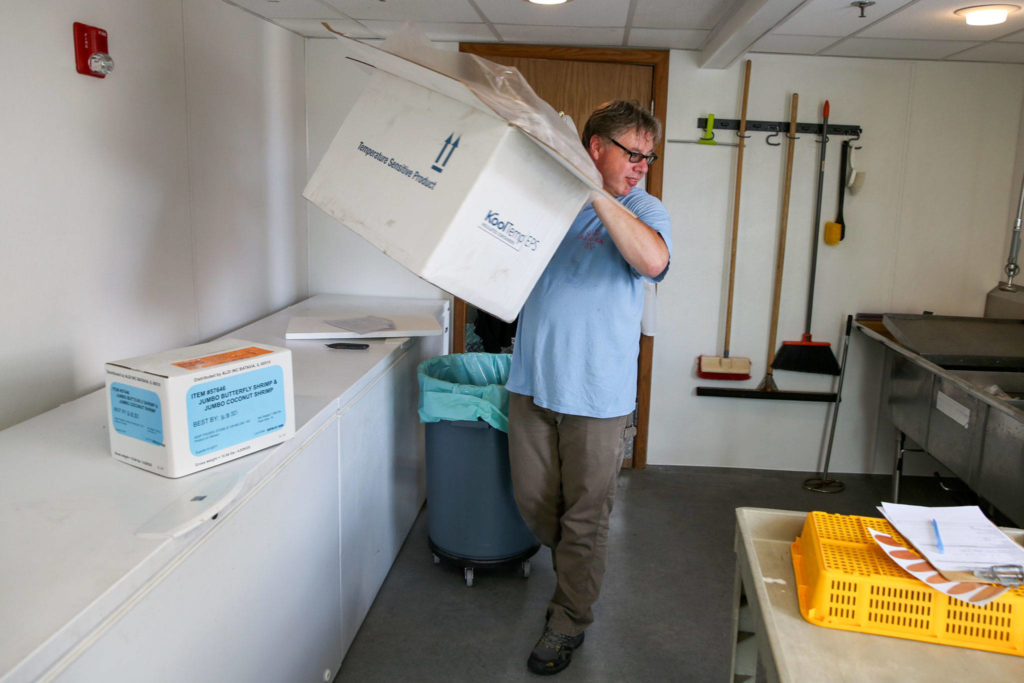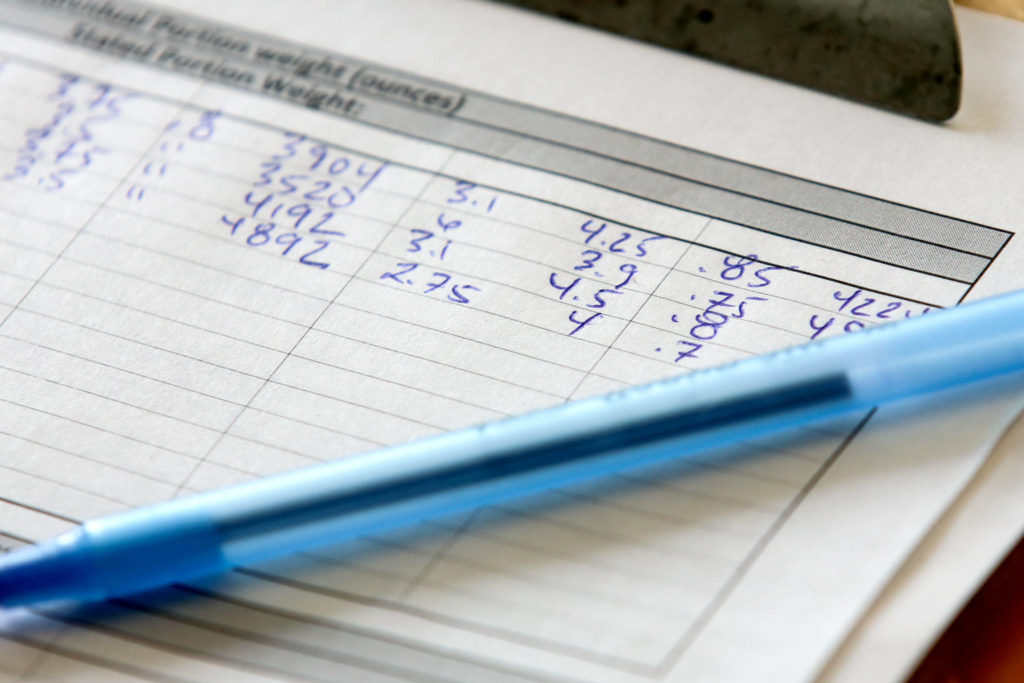EVERETT — If the tuna sushi you had for dinner feels like it’s still swimming, it might not be tuna but escolar — an eel-like fish.
While escolar can taste rich and buttery, its unique properties have helped it clinch a title: the Ex-Lax of fish.
Substituting lower-cost escolar for higher-quality, higher-cost tuna is one way unscrupulous seafood suppliers profit from your misery, says experts at NSF International Everett.
NSF International, an independent organization, tests food products, including seafood products, on behalf of retailers and distributors, among other services.
Clients want to be sure that their suppliers’ products meet their specifications, said Scott Albrecht, a senior seafood inspector.
Those checks include looking for seafood fraud.
“We’re the CSI of fish,” joked Albrecht.
The organization also provides third-party certification, testing food and equipment to ensure they meet industry health and safety standards.
NSF is a nonprofit whose operations span the globe. It recently relocated its regional seafood services program from Seattle’s Fisherman’s Terminal to the Port of Everett.
Its new office and lab are at the port’s Marina Village, near Anthony’s Homeport restaurant.
The Everett location “allows us to partner with the Washington State University/Idaho Center for Advanced Food Technology program” and is closer to Canadian clients, said Tom White, the seafood program’s global manager for certification and audits.
The port is pleased to have NSF and its seafood sleuths aboard.
“Given our strategy to support and grow the maritime and seafood industry, it’s a perfect fit,” said Terrie Battuello, the port’s chief of business development, in a prepared statement.
NSF, formerly National Sanitation Foundation, was established by the University of Michigan’s School of Public Health in 1944 to develop health and safety standards.
One of the first assignments was developing sanitation rules for soda fountains and luncheonettes.
Now NSF operates in 175 countries, including Mexico, Peru, Spain, South Africa, India, Japan and Korea.
By law, seafood suppliers are required to label what and where the species comes from.
If the label says wild-caught sockeye salmon, it better not be farm-raised salmon.
An estimated 20 percent of seafood products in the U.S. are mislabeled, according to recent study by Oceana, a nonprofit conservation group.
“Seafood fraud ultimately deceives consumers who fall victim to a bait-and-switch, disguises conservation and health risks, and hurts honest fishermen and seafood businesses,” said Beth Lowell, deputy vice president of U.S. campaigns.
“Seafood traceability — from boat to plate — is critical to ensure that all seafood sold in the U.S. is safe, legally caught and honestly labeled,” said Lowell in a prepared statement.
In 2017, Americans consumed about 16 pounds of seafood per person — the highest per-capita consumption in nearly a decade, according to a National Oceanic and Atmospheric Administration fisheries report. By comparison, Americans consumed 217 pounds of red meat and chicken per person that same year, a Department of Agriculture source said.
NSF International is one of many non-governmental industry groups that aims to protect seafood buyers.
“Most of what we do is quality checks,” said White.
On a recent visit to the Everett laboratory, seafood inspector Albrecht was opening packages of frozen pink salmon fillets.
A grocery chain wanted to know if its supplier’s salmon fillets were up to spec.
For the next hour, he measured, weighed and visually inspected one sample after another for too many bones, bruises or dimples —a tell-tale sign of parasites.
Does each fillet weigh 3 to 5 ounces and measure about 3 inches by 4 inches?
Does its pink hue match samples on a color reference card?
“We report what we find,” said Albrecht, working his way through the grocer’s quality checklist.
An unscrupulous supplier also might mislabel the country of origin and substitute a lower-priced fish such as pollack for higher-priced Walleyed pike, or escolar for albacore.
Even fish sticks can be scammed if the breading exceeds a set percentage, Albrecht said.
Too much ice on Alaskan crab legs or too much breading on butterfly shrimp can tip the scale and cheat the buyer.
Still, distinguishing one fish from another isn’t easy — even for experts.
“When you take the skin off a fish and fillet it, it loses its identity,” said White.
When it’s too close to call, NSF collects samples for DNA analysis and sends them to a lab in Ferndale, Washington.
The results are compared to the Food and Drug Administration’s growing DNA database of seafood and other foods.
To help educate buyers, NSF plans to launch new education programs, including “Fish School” for restaurant and grocery store buyers who want to boost their seafood expertise, White said.
“In our former location, we were limited to less than a dozen per class,” said White. “Here we can expand our enrollment to as many as 60 per class.”
Eventually NSF will offer a similar program for consumers “who want to become smarter seafood shoppers,” White said.
Albrecht’s job hasn’t curbed his appetite for seafood.
After spending the morning inspecting a shipping box filled with pink salmon fillets, Albrecht was looking forward to a salmon salad he’d packed for lunch.
“It’s hard to find bad seafood, especially here,” he said, referring to the Northwest.
Janice Podsada; jpodsada@heraldnet.com; 425-339-3097; Twitter: JanicePods
Recipe: Black Cod
By NSF senior seafood inspector Scott Albrecht
After filleting the cod, put it in a pan and cover it with ¼-inch to ½-inch of miso paste.
Cover and put it in the refrigerator for two days.
When you’re ready to grill, take it out of the fridge and scrape off the miso.
Black cod typically cooks in 10 minutes or less, but use a food thermometer.
Talk to us
> Give us your news tips.
> Send us a letter to the editor.
> More Herald contact information.




























